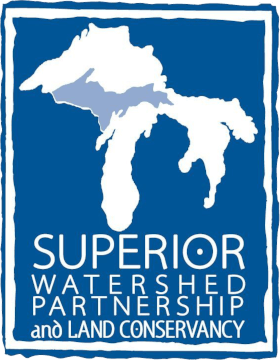Protecting Watersheds
Great Lakes Shoreline Restoration
Thanks to a grant from the Michigan Coastal Management Program and the National Oceanic and Atmospheric Administration (NOAA) the SWP in cooperation with the City of Marquette have initiated the first phase of restoring over half a mile of Lake Superior shoreline. The 3,000 foot section of shoreline targeted for restoration is adjacent to Lakeshore Boulevard and is currently heavily armored with a tall ridge of rock rip-rap that obscures the view of Lake Superior. The city will host several public meetings in 2012 to invite citizen input regarding shoreline restoration design, public access, viewing platforms, road redesign and more. 2013 will include opportunities for volunteers to assist with two small dune restoration demonstration projects. For more information please visit the City of Marquette website: www.mqtcty.org or contact the SWP.
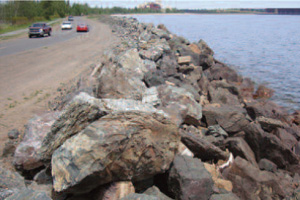
Great Lakes Dune Restoration
Did you know that less than 10% of the Lake Superior shoreline is made up of sand beach and dunes? Many unique species of plants and animals live in this somewhat rare dune and swale ecosystem. Sadly, many of our most popular Lake Superior dune systems are being impacted from overuse or misuse. Each summer the SWP completes a series of dune restoration projects. Recent projects include McCarty’s Cove in Marquette and the MDOT turn-outs along highway M-28 in Chocolay Township (funded by a FEMA grant). Dune restoration includes beach grass transplanting, native shrub and tree planting, invasive plant removal, fence building, installing signs and more. If you or your community group would like to volunteer to help on a dune restoration project please contact the SWP.
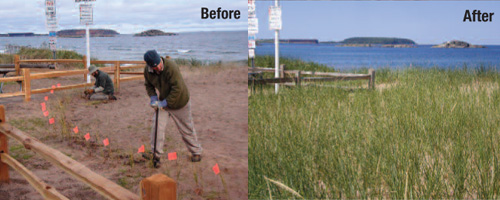
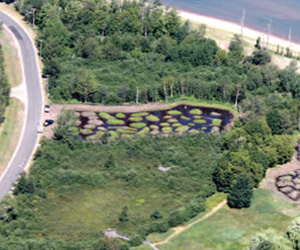
Great Lakes Coastal Wetlands Restoration
Great Lakes coastal wetlands are rare. The EPA estimates that over 50% of these unique ecosystems have been lost to development. The SWP staff is proud to be working with the City of Marquette in restoring the coastal wetland at Presque Isle Park. The approach to Presque Isle(French for “almost an island”) was once predominately coastal wetlands. Sadly, over the last century most of these wetlands have been filled in with countless tons of soil, concrete rubble and other debris. SWP staff developed the wetland restoration plan that is being used to guide the restoration process at Presque Isle. The good news is that the project will have numerous environmental benefits including improved coastal habitat for a wide variety of migratory birds. The SWP will also be assisting with the ongoing monitoring at the site.
Look for additional coastal wetland restoration work in the future! If you would like to volunteer to help with related wetland mon- itoring please contact the city or SWP.

Salmon Trout River Restoration, Marquette County
SWP plans for the Salmon Trout include; additional habitat restoration projects, expanded stream monitoring and continued public education. The SWP has also been instrumental in improving public access to this unique river system. The restored watershed and improved fishery sets the bar higher for everyone truly interested in protecting the long term health of the Salmon Trout River and Lake Superior.
Coaster Brook Trout
The SWP has completed over twenty large-scale, watershed improvement projects in the Salmon Trout. These projects prevent hundreds of tons of sediment from entering the river annually and smothering important fish habitat. All totaled over the last ten years the SWP, with local, state, federal and tribal support, has implemented nearly $1 million in protection and restoration projects just in the Salmon Trout watershed alone. The SWP works in Upper Peninsula watersheds draining to Lake Michigan, Lake Huron, and Lake Superior.
The SWP continues to implement projects that have been prioritized in the Salmon Trout River Watershed Management Plan. The plan was developed by the SWP and approved by the EPA and Michigan DEQ. SWP Watershed Planner, Geraldine Larson, credits the plan for providing an effective, science-based approach to Great Lakes habitat restoration; “The plan provides a snapshot of existing and potential impacts to the watershed and helps us prioritize projects and get the best ecological benefit with the funding we receive.”
Watershed restoration projects that have been installed by the SWP include:
Protecting Water Quality
Great Lakes Beach Monitoring
Thanks to a $77,000 grant through the EPA Great Lakes Restoration Initiative the City of Marquette and the Superior Watershed Partnership have expanded the Public Beach Monitoring Program. The program will increase the frequency and duration of beach monitoring and sanitary surveys to identify potential bacterial contamination. This project will reduce human health risks by improving monitoring, investigating any sources of bacterial contamination, and working to eliminate any sources identified. Please visit these web sites for additional information: City of Marquette and Great Lakes Beach Association.
The SWP in partnership with the City of Marquette are monitoring Marquette’s beaches to protect public health and improve water quality. This annual project also includes GIS mapping of the city storm drains leading to Lake Superior, conducting beach sanitary surveys at public beaches, rain event sampling, and public education campaigns to inform and involve citizens. During the 2011 swimming season there will be new ways for Marquette residents to become involved. Check back soon for more information.
For more information visit the state beach monitoring website here.
Rain Barrel Cost-Share Program
Starting in July 2011, the City of Marquette in cooperation with the Superior Watershed Partnership will coordinate a new rain barrel cost-share program for city residents. Rain barrels are an easy way to limit the amount of stormwater leaving your property. They also save water and can significantly reduce your summer water bill. Plus, rain barrels are easy to install on most rain gutter down spouts.
Marquette residents will enter a special code and receive a bulk discount price and have the barrel shipped directly to their home address (shipping is extra).Through a special bulk arrangement Marquette residents will be able to purchase a 50 gallon rain barrel for $100 (normally $165). Once the rain barrel has been installed residents can provide a photo (or request a site visit to verify installation) and receive an additional $50 towards the purchase price (total cost $50 after rebate). Barrels must be installed before cost share funds are released. Plus, participants in this special program will also receive a one-year membership to the Superior Watershed Partnership!
Funding is limited so cost-sharing is available on a first come first served basis (approximately 120 rain barrels). After the cost-share funds have been exhausted city residents can still purchase a rain barrel at the bulk discount price ($100 vs. $165). Funding was provided through the EPA Great Lakes Restoration Initiative. Note: The program officially begins July 5th. One rebate per household.
If you do not have access to a computer simply contact the SWP for more information on how to participate (906-228-6095).
Red Bucket Program
Sometimes it’s the most simple, low-cost Shoreviewer projects that get the most attention. The SWP in cooperation with the Marquette County Community Foundation used simple red buckets to raise awareness about runoff pollution, storm drains and reducing cigarette litter on our beaches. Recent smoking ordinances have had the unintended consequence of increasing cigarette litter on our sidewalks and streets. When it rains (or snow melts) thousands of cigarette butts are washed down our storm drains into Lake Superior and wash up on our beaches. To address the problem the SWP provided businesses with free red buckets filled with beach sand to encourage proper disposal of cigarette butts. Not only did the program dramatically reduce cigarette litter it also raised community awareness about storm water runoff. The red bucket program has since been replicated by other communities an was featured at the EPA Great Lakes beach conference. The SWP also continues to sponsor annual citizen beach clean-up events. If your business or community organization would like more information about these beach programs please contact the SWP.
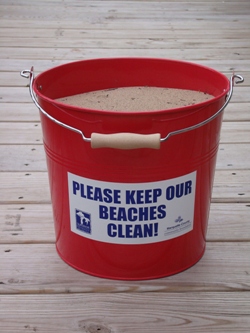
Cigarette Butt Program
The Superior Watershed Partnership, the Marquette City Police Department, and the Marquette County Health Department are working together to educate the public about the link between storm drains and beach litter.
Did you know that when you flick your butt out of your car window it will more than likely end up on one of Marquette’s beautiful beaches? Here’s what happens. Underneath the ground throughout the entire city are a system of storm sewer pipes. They receive rain water and other debris from the storm drains along the curbs. Anytime it rains whatever is on the surface of the pavement flows into the drains. There are a series of outfalls into Lake Superior where the storm drain deposits all the rain and debris. Cigarette butts travel through these pipes and into Lake Superior through these outfalls.
Why should you care? First of all flicking butts out your car window is illegal. Second these butts enter Lake Superior from the outfalls and then wash back onto the shore littering our beaches. Finally, these butts enter the Lake and float to the surface of the water. Fish often mistake butts for food. Since the filters aren’t digestible, they get stuck in the fishes system causing potential physiological damage.
In short…don’t flick it.
Watershed Planning
The Superior Watershed Partnership has completed 6 watershed management plans.
Click here for a list of other SWP plans.
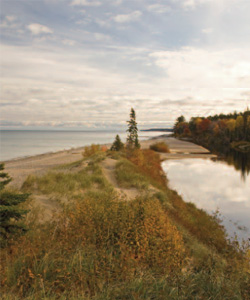
The Big Two Hearted River Watershed
The first step in restoring a watershed is developing a prioritized management plan that is then approved by EPA and the State of Michigan. Thanks to 319 funding through the Clean Water Act the SWP developed a comprehensive plan for the Two Hearted River Watershed. Over the last several years the SWP in cooperation with The Nature Conservancy(TNC) and other local partners has been working to implement the plan by installing a number of large scale restoration projects that control erosion, improve habitat and provide better public access. TNC and SWP restoration projects have been funded primarily through the EPA Great Lakes Restoration Initiative (GLRI). To date, four field projects have been installed and more are scheduled. We think Ernest Hemingway, author of “The Big Two Hearted River”, would be pleased. For more information about the projects or to learn about Two Hearted volunteer opportunities please contact the SWP.
Two Hearted Appendices
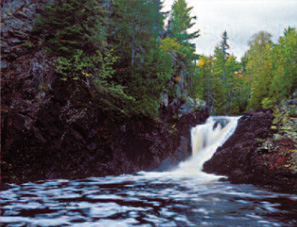
Improving a Great Lakes Area of Concern (AOC):
Thanks to a grant from the Environmental Protection Agency (EPA) the SWP is currently working on a comprehensive assessment of the Carp River Watershed to identify sources of run-off pollution and contamination with an emphasis on mercury sources. The Carp River is listed as a Great Lakes Area of Concern (AOC) due to historic mining and laboratory activities. The good news is that the primary sources of contamination are being addressed through the Great Lakes Restoration Initiative (GLRI) and natural attenuation. The SWP project will also address secondary sources of contamination and will include the cities of Ishpeming, Negaunee and Marquette. Once completed the Carp River AOC assessment will be used to secure grant funding to implement prioritized community pollution prevention projects.
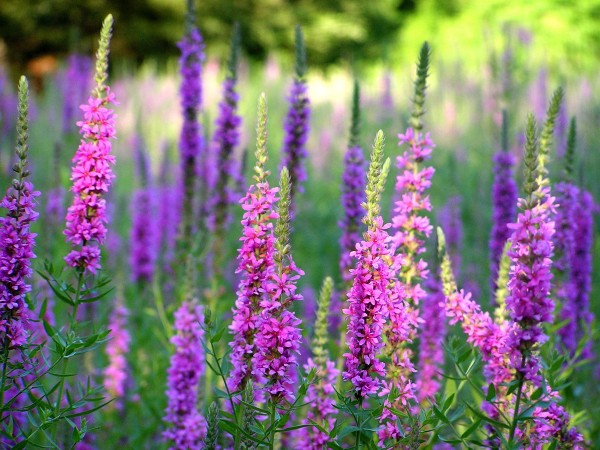
Invasive Species:
The SWP partners with the Central Upper Peninsula Cooperative Weed Management Area on a variety of invasive species removal projects.
Resources for Learning
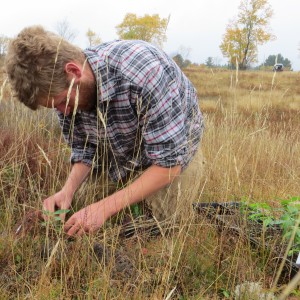
Native Plant Restoration:
The SWP implements habitat restoration projects on many different levels including invasive species removal, native species planting, road/stream culvert replacement, and much more! LEARN MORE
Resources for Learning
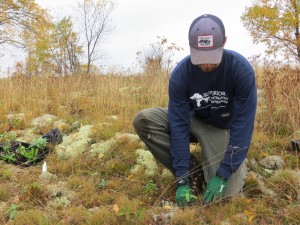
Habitat Protection and Restoration:
With the help of many project partners, the SWP’s habitat protection and restoration projects have improved the homes of a huge range of native Michigan species, from coastal dune grass to monarch butterflies.
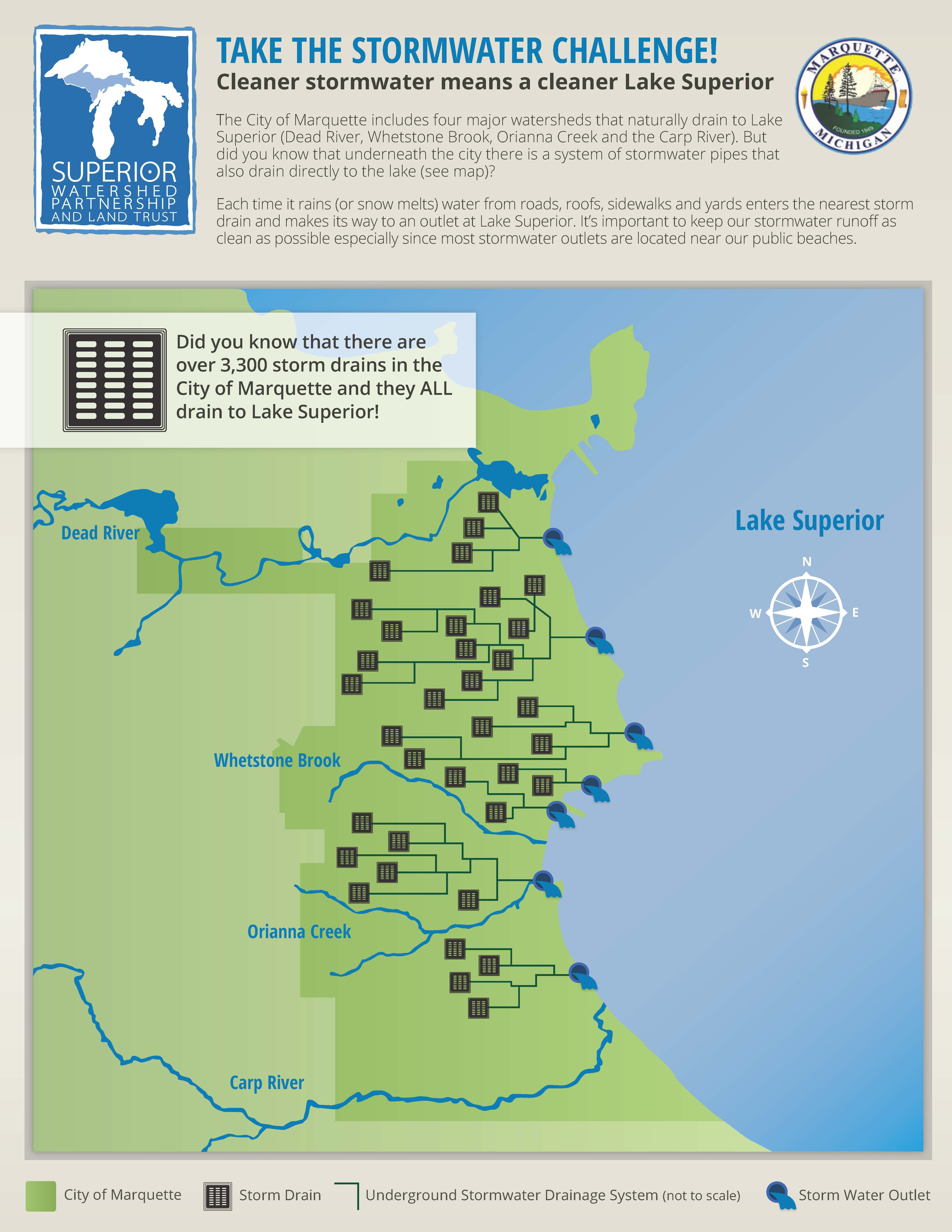
Water Quality and Stormwater Management:
The City of Marquette includes four major watersheds that naturally drain to Lake Superior (Dead River, Whetstone Brook, Orianna Creek, and the Carp River). But did you know that underneath the City there is a system of stormwater pipes that also drain directly to Lake Superior? Each time it rains (or snow melts) water from roads, roofs, sidewalks, and yards enters the nearest storm drain and makes its way to an outlet at the shore of Lake Superior.
